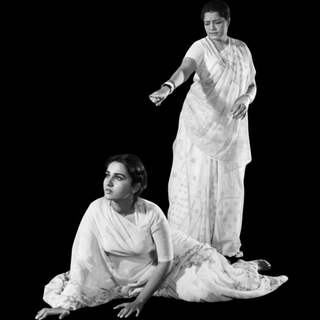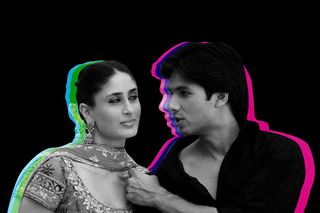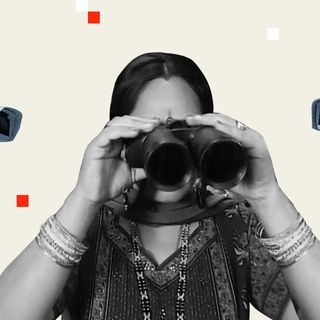
Can’t Let Go: Of Self‑Love in ‘Jab We Met,’ Despite Imtiaz Ali’s Man‑Children
While we can’t watch any more of Imtiaz Ali’s tiring tropes, Jab We Met is a refreshing reminder of learning from women who love themselves.

In Can’t Let Go, we revisit the nostalgia around our favorite pop culture moments that haven’t aged well.
It is hard to trace the origin of someone’s fall, the exact moment when they went wrong. For Imtiaz Ali, it may as well have been right after “Jab We Met.” Popular culture has happily dethroned Ali from the cinema’s pedestal for overdoing stereotypes and trying to tell the same story over and over again from a sexist lens or worse, defending it.
And while ‘Jab We Met’ (JWM) could have been a great movie, it is now marred with the legacy of being an Imtiaz Ali film. It’s a fun narrative of love and life butthe story harps on to the “strong women” character myth Ali has tried to sell us now and again. Even in JWM, the clues of what makes an Imtiaz Ali movie were all there: the woman exists so that the forlorn man-child can discover himself. Geet Dhillon (played by Kareena Kapoor Khan) may as well have been a chance finding, a necessary infusion to bring Aditya Kashyap (played by Shahid Kapoor) right on track. And just like the women characters to come after her, Geet is a resilient and present part of Imtiaz Ali’s canon.
But not all’s lost in the world of “Jab We Met”. The characters escaping, finding themselves on their journey allows the movie breathing room. Definitively the “good days” of Imtiaz Ali. The movie remains relevant for the personality Geet carved for herself, shaping a novel cinematic idea of self-love.
Geet’s selling point through the movie is one of being content with oneself. “Main apni favorite hun” (I’m my favorite person), she says, without care or concern. In doing so, she also escapes the criticism directed to Ali’s characters, where the women want others’ (in most cases, the male lead) validation. But the bubbly Geet exudes joie de vivre, a love for life, not giving a shit about what anyone thinks is an important part of her personality. Self-love is either posited as narcissism or in a one-tone depiction. Here, the desire to be at peace and appreciating who we are seems paramount.
And while her character was critical to allowing Aditya’s growth through the movie, the two dynamics exist in tandem without hurting each other. Her character is also in defiance of other Imtiaz Ali narratives: she believes in the hero so that he believes in himself, but JWM is as much Geet’s story as it is Aditya’s. Geet is a character who is more than just a love interest of a lost man with a good heart — or as Aditya, would say: “Tumhe uthakar museum mein rakhna chahiye… ticket lagni chahiye tumhe dekhne ke liye.” [You should be kept in a museum, people should buy tickets to watch you.]
Related on The Swaddle:
Can We Move On: From the ‘Happily Ever After’ Trope That Doesn’t Include Unconventional Paths to Happiness
Which also makes Geet a character of strength, unlike others in the Imtiaz Ali world. The director has maintained that each character is strong and independent; but from Deepika Padukone in ‘Love Aaj Kal’ to Anushka Sharma in ‘Jab Harry Met Sejal’ the claim couldn’t stray far from reality. But Geet has agency — she decides whom to love, what to say, refusing to shut down at the mere inconvenience of others. She runs away from home to marry someone, builds her own life when it doesn’t work out, and perseveres on.
Take this for instance: a stranded Geet at the railway station goes to the ticket collector’s office to ask for her luggage. The sexism reeks through every frame, as he calls the “akeli ladki” a “khuli tijori.” Of course, this does little to wear Geet’s spirit down, as she instinctly replies: “Aap jo yeh bolte hai, iske paise charge karte hain ya muft ka gyaan hai? Kyunki chillar nahi hai mere paas…” [Do you charge for what you say or is this wisdom for free? Because I don’t have pennies to give.] These are tacit displays of resistance against the world and patriarchy that don’t submit to ideas of compromise.
As a movie, JWM also tries to set a narrative of self-discovery and living, among the first to do so. People are weighed down by life, serendipitously meeting others or escaping to another world. Had Ali not overused this or reduced it to a virtue only male characters could have, the idea of running away and finding oneself remains ever-so-important in a world of constant change.
And lastly, it is hard to deny ‘Jab We Met’ was the beginning of a new era of modern romance, of defining love for a young generation. The tragedy of losing love, the maturity in finding it, and coping in the meantime are complex notions that struggle to translate onto the screen. But JWM offered a good reference; Ali’s idea of love may not hold in the long run, but Geet’s and the movie’s quest for finding people and love was a starting point we all enjoyed.
‘Jab We Met’ was Imtiaz Ali before the clichés. Anything after, even if along with the same plot, does injustice. And while we can’t watch more tired iterations of the same love story in a male-centric world, individual shades of living and longing promise freshness and originality.
The movie’s memory is frozen in the autumn of 2007, cushioned between two train berths, watching two strangers find each other and themselves. Perhaps, this is why it is so hard to let it go.
Saumya Kalia is an Associate Editor at The Swaddle. Her journalism and writing explore issues of social justice, digital sub-cultures, media ecosystem, literature, and memory as they cut across socio-cultural periods. You can reach her at @Saumya_Kalia.
Related


Indian Culture Normalizes Spying. This Affects How We View Digital Privacy
